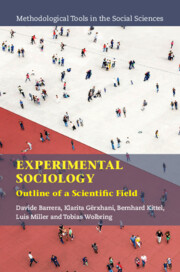Book contents
- Experimental Sociology
- Methodological Tools in the Social Sciences
- Experimental Sociology
- Copyright page
- Contents
- Figures, Tables, and Boxes
- Preface
- 1 Introduction
- Part I The Philosophy and Methodology of Experimentation in Sociology
- Part II The Practice of Experimentation in Sociology
- Part III Methodological Challenges of Experimentation in Sociology
- 10 Validity
- 11 Incentives
- 12 Ethics and Deception
- 13 Experimental Sociology – Quo Vadis?
- References
- Index
12 - Ethics and Deception
from Part III - Methodological Challenges of Experimentation in Sociology
Published online by Cambridge University Press: 23 November 2024
- Experimental Sociology
- Methodological Tools in the Social Sciences
- Experimental Sociology
- Copyright page
- Contents
- Figures, Tables, and Boxes
- Preface
- 1 Introduction
- Part I The Philosophy and Methodology of Experimentation in Sociology
- Part II The Practice of Experimentation in Sociology
- Part III Methodological Challenges of Experimentation in Sociology
- 10 Validity
- 11 Incentives
- 12 Ethics and Deception
- 13 Experimental Sociology – Quo Vadis?
- References
- Index
Summary
Experimental practices developed in different scientific disciplines following different historical trajectories. Thus, standard experimental procedures differ starkly between disciplines. One of the most controversial issues is the use of deception as a methodological device. Psychologists do not conduct a study involving deception unless they have determined that the use of deceptive techniques is justified by the study’s significant prospective scientific, educational, or applied value and that effective nondeceptive alternative procedures are not feasible. In experimental economics it is strictly forbidden and a ban on experiments involving deception is enforced by all major economic journals. In the sociological scientific community, there is no clear consensus on the matter. Importantly, the disagreement is sometimes based on ethical considerations, but more often it is based on pragmatic grounds: the anti-deception camp argues that deceiving participants leads to invalid results, while the other side argues that deception has little negative impact and, under certain conditions, can even enhance validity. In this chapter, we first discuss the historical reasons leading to the emergence of such different norms in different fields and then analyze and separate ethical and pragmatic concerns. Finally, we propose some guidelines to regulate the use of deception in sociological experiments.
Keywords
Information
- Type
- Chapter
- Information
- Experimental SociologyOutline of a Scientific Field, pp. 144 - 153Publisher: Cambridge University PressPrint publication year: 2024
